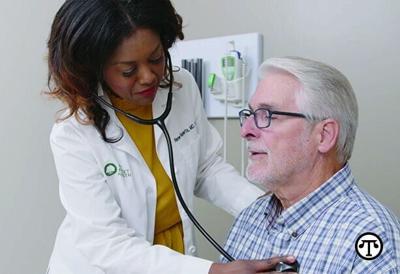by Rene Roberts, M.D.,
Oak Street Health
(NAPSI)—If you or someone you care about is the 1 in 9 Americans the CDC estimates has diabetes, the answers to these 7 questions can help you enjoy happier holidays and a healthier new year.
Q. What is diabetes?
A. Diabetes is a chronic illness that develops from a combination of genetics, diet and lifestyle. Too much sugar in the bloodstream can stick to red blood cells and scrape the sides of blood vessels, causing damage and allowing the sugar to escape to other parts of the body.
Q. Why is diabetes so worrisome for older adults?
A. Most of the time, it’s not the diabetes but the complications that cause concern. Diabetes can lead to loss of feeling in extremities, loss of vision, and chronic kidney disease.
Diabetes needs to be taken seriously, especially during the holidays when older adults with diabetes can face real challenges—from navigating sweet, carb-heavy meals to keeping up with their medication and meal routines when travel or family plans get in the way. Even skipping one meal or taking insulin late can throw off blood sugar. And for many, this season can bring on loneliness or stress, which can raise blood sugar by triggering hormones that make the body less responsive to insulin.
Q. What are the signs of diabetes?
A. Symptoms can include:
- Increased thirst
- Frequent urination
- Increased hunger
- Fatigue
- Blurred vision
- Numbness or tingling in the hands and feet
- Slow-healing wounds
Q. Are certain holiday foods especially tricky for older adults with diabetes?
A. Yes, dishes high in sugar and simple carbs such as stuffing, mashed potatoes, sweet potato casserole, rolls, cranberry sauce and pies can spike blood sugar quickly. It’s a good idea to pair carbs with protein or fiber to slow absorption and keep glucose more stable.
Q. What should families watch for in case someone’s blood sugar goes too high or too low?
A. If a loved one seems “off” don’t wait. Offer them a small snack that can quickly raise their blood sugar, such as fruit juice, a tablespoon of honey, gummy candy, glucose tablets or gel. Check their blood sugar level, and if symptoms worsen, call for help.
Q. How can families help older relatives who may have diabetes?
A. It’s important to talk with loved ones about prioritizing their health as they age, but it can be a sensitive subject, and many older adults may be hesitant to talk about it. Start these conversations with empathy and respect to show you’re coming from a place of care and concern rather than control. It’s also good to start the conversation in a moment where they are relaxed and not one where they are stressed, emotional, or distracted. Asking open-ended questions such as, “How do you feel about the routine you have for staying active?” or “Are there any changes you’ve noticed in the way you feel when you do normal activities?” can help you understand their perspective and concerns. It’s also encouraging to help them focus on goals and not limitations to maintaining independence and quality of life.
Q. How do you treat diabetes?
A. Treatment is usually a combination of prescription drugs and lifestyle modifications, such as diet and physical activity.
A Problem
Some of the biggest barriers to proper treatment are access to healthy food, safe places to exercise, affordable medications, and transportation to appointments to ensure their diabetes isn’t worsening. Many of my patients live with financial strain or are navigating multiple health issues at once. Even access to family support can play a big role in a patient’s treatment.
A Solution
At Oak Street Health, we have care teams that include social workers, behavioral health specialists, and community health workers who help patients navigate these obstacles. Whether it’s connecting someone with a food pantry or helping them get the most out of their Medicare benefits, we meet patients where they are and build from there. Access to continuous glucose monitors (CGMs) and education on how to use them is another big factor in helping patients monitor their blood sugar.
We talk about what they’re eating, how they’re feeling, whether they can afford their medication, and what kind of support they have at home. Every care plan is built around the patient’s reality. For one person, it might mean adjusting their insulin regimen because of their work schedule. For another, it might mean focusing first on mental health before even talking about diet.
Our behavioral health specialists help patients manage the emotional toll of chronic illness. We offer wellness classes and social activities that give patients a sense of community and support, because physical and emotional health go hand-in-hand.
Learn More
To learn more about Oak Street Health or to schedule a visit, call 855-252-6756. To find a location near you, visit oakstreethealth.com/locations.
• Dr. Roberts is a board-certified Family Medicine specialist.
Word Count: 789







(0) comments
Welcome to the discussion.
Log In
Keep it Clean. Please avoid obscene, vulgar, lewd, racist or sexually-oriented language.
PLEASE TURN OFF YOUR CAPS LOCK.
Don't Threaten. Threats of harming another person will not be tolerated.
Be Truthful. Don't knowingly lie about anyone or anything.
Be Nice. No racism, sexism or any sort of -ism that is degrading to another person.
Be Proactive. Use the 'Report' link on each comment to let us know of abusive posts.
Share with Us. We'd love to hear eyewitness accounts, the history behind an article.